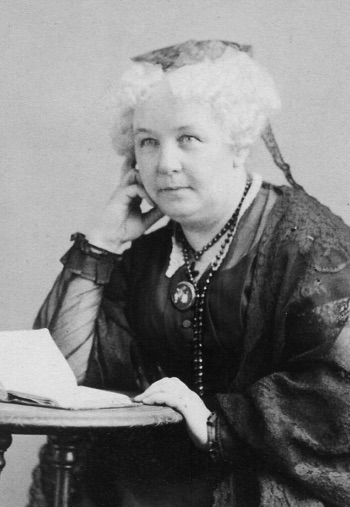|
Elizabeth Cady Stanton was an American suffragist, social activist, abolitionist, and leading figure of the early women's rights movement. Born on November 12, 1815, in Johnstown, New York, Stanton grew up in a family that valued education, social justice, and reform. Stanton's father, Daniel Cady, was a prominent lawyer and judge, who served in the New York State Assembly and Senate. Her mother, Margaret Livingston Cady, was a descendant of early Dutch settlers and a committed homemaker, who raised her children with a love of learning and a sense of social responsibility. As a young girl, Stanton attended Johnstown Academy, where she excelled in her studies and developed a lifelong passion for reading, writing, and debating. However, she soon realized that her opportunities for higher education and career advancement were limited by her gender. Stanton's early experiences of gender discrimination and inequality inspired her to become a women's rights advocate. In 1840, she married Henry B. Stanton, a prominent abolitionist, and became involved in the anti-slavery movement. Stanton's involvement in the abolitionist cause deepened her awareness of the parallels between the struggles of African Americans and women for equality and freedom. She became convinced that women's rights were human rights and that women's liberation was essential for the advancement of society as a whole. In 1848, Stanton helped organize the Seneca Falls Convention, the first women's rights convention in the United States. The convention was attended by over 300 people, including many leading suffragists and abolitionists, such as Lucretia Mott, Frederick Douglass, and Susan B. Anthony. At the convention, Stanton delivered her famous "Declaration of Sentiments," which called for women's right to vote, own property, receive education, and pursue their own careers. The document was modeled after the Declaration of Independence and declared that "all men and women are created equal." Stanton's bold and visionary leadership helped to catalyze the women's rights movement and inspire generations of activists. She co-founded the National Woman Suffrage Association with Susan B. Anthony in 1869 and served as its president until 1890. Stanton also wrote extensively on women's rights and social justice issues. Her works include "The Woman's Bible," a critique of patriarchal interpretations of the Bible, and "Solitude of Self," a powerful defense of women's autonomy and dignity. Despite facing criticism and opposition from some quarters, Stanton remained steadfast in her commitment to women's rights and social justice. Her vision of a society that honored the full humanity and potential of all people continues to inspire and guide generations of activists and change-makers. In recognition of her contributions to the women's rights movement, Stanton was inducted into the National Women's Hall of Fame in 1973, and her likeness appears on a commemorative coin issued by the U.S. Mint in 2020. |
